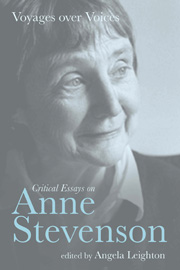Book contents
- Frontmatter
- Contents
- Notes on Contributors
- Acknowledgements
- ‘Making Poetry’
- 1 ‘Voyages over voices’: Introduction
- 2 The Melting Metaphor
- 3 ‘Between us’: Letters and Poems of Stevenson and Bishop
- 4 Mothers, Mirrors, Doubles: Anne Stevenson's Elegies for Sylvia Plath
- 5 Staging Second Thoughts: The Poetry of Anne Stevenson
- 6 ‘Making Poetry’: The Exemplary Anne Stevenson
- 7 ‘A curved adventure’: Romanticism and the Poetry of Anne Stevenson
- 8 The Nature of Anne Stevenson
- 9 Anne Stevenson and the Poetry of Place
- 10 Compacting Time: Anne Stevenson's Poems of Memory
- 11 ‘Not exactly a persona’: Pronouns in Anne Stevenson's Poetry
- 12 ‘To serve a girl on terrible terms’: Anne Stevenson's Writing Selves
- 13 Talking and Singing: Anne Stevenson's Variations on a Rhythmical Theme
- 14 ‘Time will erase’: Anne Stevenson and Elegy
- 15 Observing the Overhearing: The Anne Stevenson Papers in Cambridge University Library
- 16 Bibliography of Anne Stevenson's Published Works
- General Index
- Index of Stevenson's Works
14 - ‘Time will erase’: Anne Stevenson and Elegy
- Frontmatter
- Contents
- Notes on Contributors
- Acknowledgements
- ‘Making Poetry’
- 1 ‘Voyages over voices’: Introduction
- 2 The Melting Metaphor
- 3 ‘Between us’: Letters and Poems of Stevenson and Bishop
- 4 Mothers, Mirrors, Doubles: Anne Stevenson's Elegies for Sylvia Plath
- 5 Staging Second Thoughts: The Poetry of Anne Stevenson
- 6 ‘Making Poetry’: The Exemplary Anne Stevenson
- 7 ‘A curved adventure’: Romanticism and the Poetry of Anne Stevenson
- 8 The Nature of Anne Stevenson
- 9 Anne Stevenson and the Poetry of Place
- 10 Compacting Time: Anne Stevenson's Poems of Memory
- 11 ‘Not exactly a persona’: Pronouns in Anne Stevenson's Poetry
- 12 ‘To serve a girl on terrible terms’: Anne Stevenson's Writing Selves
- 13 Talking and Singing: Anne Stevenson's Variations on a Rhythmical Theme
- 14 ‘Time will erase’: Anne Stevenson and Elegy
- 15 Observing the Overhearing: The Anne Stevenson Papers in Cambridge University Library
- 16 Bibliography of Anne Stevenson's Published Works
- General Index
- Index of Stevenson's Works
Summary
In the autumnal opening section of Anne Stevenson's book-length elegy A Lament for the Makers (2006), ‘the season of deciduous souls’ provokes a sobering thought about the endurance of poetry:
A last, late finger of grace
still brightens far reaches
of a barbarous empire
lyrically and lovingly.
Most of what we write
time will erase.
Such small comfort as can be gleaned from this world of decay comes from the word ‘lyrically’, which signals the poem's self-representation as a ‘last, late finger of grace’ before the dying of the light. The word ‘grace’ connotes secular sanctification: poetry has replaced religion and does religion's work, although it now risks going the way of religion into obsolescence. Despite her worry, Stevenson enacts the Lament's continuing faith in lyrical light by reserving for this passage some of her most exquisite images: ‘gold smoulder[s] to umber’ in a ‘reredos of beeches’ illuminated ‘with Byzantine fire’. (The ‘reredos’ suggests and displaces religion again.) But notwithstanding the gorgeous conflagration, the year is inevitably ‘darkening’. By alluding to Dunbar, Stevenson's title recognises that poets have no special dispensation to be spared the way of all flesh: ‘Sparit is nocht ther faculte’, the poem's epigraph quotes from its medieval predecessor.
Even the consoling survival of poetry cannot be assumed. As Stevenson explains in interview, she writes her Lament as an elegy not only for poets but for poetry itself – ‘at least for the kind of poetry that, at my lowest ebb, I imagine is about to disappear from Western civilisation’.
- Type
- Chapter
- Information
- Voyages over VoicesCritical Essays on Anne Stevenson, pp. 206 - 213Publisher: Liverpool University PressPrint publication year: 2010



